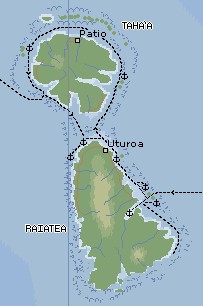
Click the map for a
Society Islands overview
|
Pacific Landfalls Fr. Polynesia Pages Related Pages |
Raiatea/Tahaa
 Click the map for a Society Islands overview |
Language: Tahitian, French
Population: 10,000 in Raiatea, 4,500 in Tahaa
Money: French Polynesian Franc, 94CFP/US$
Landscape: Two lush, volcanic islands inside a single lagoon.
Visited: Twice: March 14 to 17, and March 25 to April 29, 2004
History: Raiatea was originally called Havai'i, and legend has it
that Queen Rainuiatea renamed the island after her parents - Rai and Atea. It
was traditionally the center of political, religious, and cultural holding of
Tahiti-Polynesia - at least until the Europeans came.
Captain Cook visited Raiatea three times - it is said that it
was his favorite island. In his three visits, ranging between 1769 and 1777,
Cook spent a total of about two months anchored in the Raiatea lagoon.
The people of Raiatea accepted Christianity after the
Tahitians did. Their conversion was probably quickened by the arrival of the
noted Protestant missionary John Williams. He departed from there to Rarotonga
in the Cook Islands in 1823.
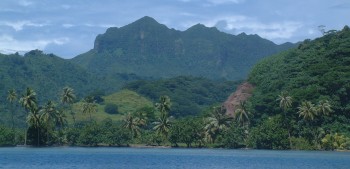 The beautiful coastline of Raiatea |
When France annexed the Leeward Islands in 1887, they were met by a ten-year resistance from Raiatea. Chief Teraupoo, the leader of the campaign, was eventually captured as French troops swarmed the island and warships filled the lagoon. He was deported to New Caledonia, and the Queen of Raiatea was exiled to the remote island of Eiao with 136 of her followers.
(Sue) On our first visit to Raiatea I was struck by the lack of sandy, reef-side anchorages which we had always sought out in the other Society Islands. Instead, we found ourselves nosing into deeply cut bays with water depths of over 80 feet. On our return at the end of March, we had more time to explore and found some lovely spots in 8 feet of water over white sand. Raiatea has the second largest population after Tahiti, but its small town of Uturoa is a lovely place with a city dock (harboring the ferries to Tahaa), a few banks, general goods stores, three grocery stores (none very big), and some tourist shops for those arriving by cruise ship. There are no public buses, so hitching is the norm for visiting yachties as we made our way the 6 miles (10 km) from the anchorage off a boat yard (where we found all the other cruisers) to the town of Uturoa.
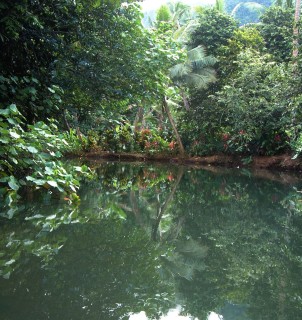 Still reflections and lush forest on the Apoomau River, Raiatea |
The highlight of the Raiatea visit was the dinghy trip up the river at the head of Faaroa Bay. We reveled in the fresh water scent, the overhanging branches of giant hibiscus, and the floral displays along the banks. We went up twice, once with our visitors Bill and Mary and their kids, and again with cruising friends on Cookie Cutter. On the second trip we tied the dinghy to a dock and walked ashore through the botanical garden. Many photos we took are on the French Polynesia Flora page.
(Amanda) It's rather a shame that we spent so much time in
Raiatea when there were much more beautiful, remote anchorages that we could
have gone to (including in Bora Bora) but I guess the
cruising inertia just sort
of kept us in one place. For there we found the largest cruising community since
Tahiti - and lots of the boats in Tahiti had been French.
But the sad bit was that most of the boats we wanted to hang out with in Raiatea
were up on the hard for the cyclone season, or just barely coming off - which
meant they were spending the next few weeks at the dock.
But that didn't stop us from finding any little anchorage we
could and milking it for all it was worth - my sadness is that we didn't ever
get back up to Tahaa after circling around it so briefly before toodling off to
Bora Bora. The anchorages were shallower, the sand sandier, the sun brighter...
okay maybe that's going a bit far. Maybe it's just human nature to want what you
didn't have. If we had spent all that time in Tahaa instead, I would be griping
that we never got to the town, and there was no one around, etc. etc. You all
probably know how it goes.
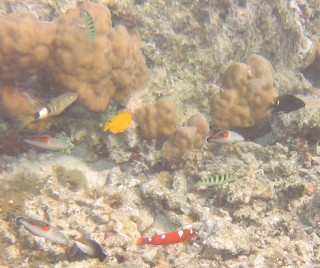 Swarms of fish around a coral head in Raiatea |
(Jon) We had a glorious spinnaker run from
Huahine to Raiatea with
Bill & Mary.
Once there, we took the dinghy exploring up a fresh-water stream, a fun activity
as the scenery is very different, we can explore with minimal exertion, and
even take a fresh-water swim if we
want. Then we proceeded to explore some of the motus on the outer reef
that surrounds both Raiatea and Tahaa, looking for the beautiful sandy banks and
snorkeling grounds we'd found on Huahine. We spent several days
circumnavigating Tahaa (without actually going ashore at the main island), anchoring
at some of the outer motus. When we returned from
Bora-Bora, we anchored near the NW corner of Raiatea where the other
cruisers were (Cookie Cutter, Amadon Light, Hawaiian Song, Mintaka, Heidi, Prism, Captain's
Fansea, Embla, Music, Dazzler, etc.). Most had put their boats on the hard
for cyclone season and were just returning and getting their boats back into
sailing trim. We were more interested in playing as we were already mostly
in cruising trim except for having to wait for watermaker parts (a small ring
had broken inside our watermaker -
Spectra sent us 4
replacement rings, 2 ring removal tools, and 2 new pump heads, all for
free, allowing us to bring our watermaker back to like-new condition).
So we anchored out about 1/2 a mile (1 km), on the edge of the sand-bank but over a
50' coral wall. While the weather was calm, it made for nice snorkeling.
We even did a night snorkel, and Chris got some nice pictures of a clearfin lionfish,
with its long, poisonous spines.
The town of Uturoa was quaint. Without public transit,
we had to hitchhike each way. It felt strange teaching my teenage kids how
to hitchhike, but it's probably safer here than most places. Throughout
French Polynesia, I was repeatedly picked up by women driving alone - life here
seems delightfully safe that way. Since our next stop,
Tonga, had little to buy
besides fresh fruit and vegetables, we stocked up on some canned and frozen
items, but there wasn't much available. We also stocked up on fuel, which
was a bit of a mistake as gasoline was much cheaper in Tonga (but the diesel
proved useful on the passage).
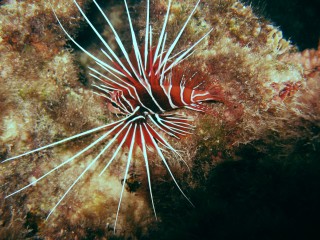 Clear-fin Lion-fish at night, with its long, poisonous spines |
(Chris) While we certainly spent a long time in Raiatea, my
best memories are not of the island itself or its little town, but the
snorkeling (I wanted to dive, but we never did) inside the island's barrier
reef. I got lots of practice with the underwater digital camera, trying to get
the best shots of fish, corals, eels, shells, and so forth. The most exciting
snorkeling trip was at night during the full moon. Urbanites might not believe
me (I'm not sure I would have), but down here it is possible to read a novel by
the light of the full moon. We were anchored out on sand flats that stretch out
to the barrier reef, but there were several coral heads nearby. Of course, the
water dims the moonlight so much that we had to take lights with us (in plastic
bags, since we don't actually have any underwater lights) but I had a lot of
fun. Unfortunately, we didn't really see the coral polyps we had hoped would be
out (the full moon may have actually been too bright for them.) However, I did
get some great pictures of a lionfish. Imagine free-diving diving 20 feet (6
meters) holding a light in a bag in one hand, a camera in the other, to
photograph a lionfish at night! Very exhilarating, but I think we need some
better lights. I would love to go for a night dive sometime.
The other exciting part of Raiatea itself was the Apoomau river, the only
navigable river in French Polynesia. Large, slow-moving, and beautiful, the
river was decorated with a scattering of glorious blossoms in colors ranging
from purple-red to dark yellow. The banks were lushly vegetated and the water
was calm enough to reflect the surrounding scenery.
Raiatea was also memorable for all the friends there, both
coming down from the US
(Bill, Mary, Meredith, Brendan, and
Pam and Kathy)
and those newly met, cruisers such as Peter and Connie on Cookie Cutter.
There is a large haul-out and storage area on Raiatea, and many cruisers were
coming off the hard as we arrived.
Tahaa was, for me, an area to explore underwater. I don't
think I even touched the island, but I enjoyed snorkeling its nearby reefs. I
keep asking to dive more, but no such luck. Of course, we did have non-diving
friends on board.
Marquesas Newsletters | Tuamotus Newsletters | FP Flora & Fauna
Top Level: Home | Destinations | Cruising Info | Underwater | Boat Guests | Ocelot | Sue | Jon | Amanda | Chris | Site Map | Make a Comment
|
If our information is useful, you can help by making a donation |
Copyright © 2000‑ Contact: Jon and Sue Hacking -- HackingFamily.com, svOcelot.com. All rights reserved.